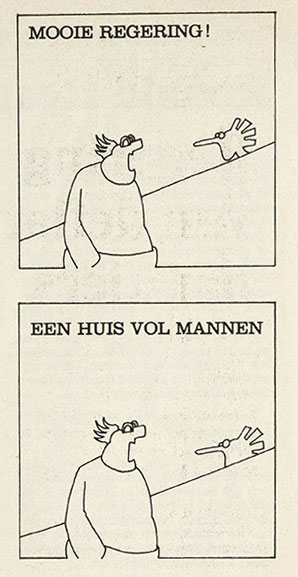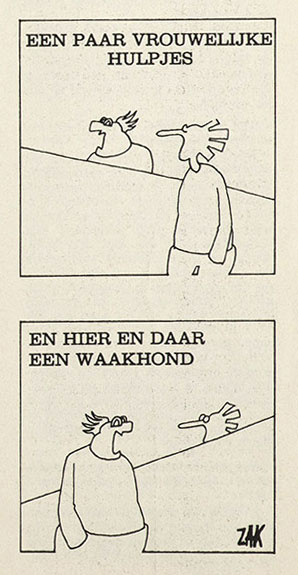Translation: "We've got everything to be happy." - "On video!"
Zak is a Belgian editorial cartoonist, since 1984 best known as the house cartoonist of the left-wing, progressive newspaper De Morgen. With his simple line drawings, he offers an ironic look at current events. Originally, he attacked specific celebrities, which he caricatured in both cartoons and comic strips. Later he favored one-panel gag cartoons and became less direct in his targets. Most of his cartoons poke fun at topical situations from the viewpoint of average people. This more timeless approach also gives him the opportunity to compile older work in annual pocket agendas ('De Zakagenda').
Early life and career
Zak was born in 1948 in Ghent, East Flanders, as Jacques Moeraert. His pseudonym "Zak" has a double meaning in Dutch: it's both the word for "sack" and a vulgar insult, referring to a ballsack. Zak was initially a bookkeeper, but switched to cartooning at the age of 25. Together with his cartoonist friend Quirit, he had his first regular spot in Johan Anthierens' satirical magazine De Zwijger (1982-1984). In 1983, the publisher Kritak additionally released Zak's comic book 'Hoe Kwamen Onze Jongens Ertoe Met De Romeinen Te Collaboreren?' ("How Did Our Boys Come to Collaborate with the Romans?").
Early magazine cartoon from 24 December 1981. Translation: "What a fine government! A house filled with men, a few female aids and here and there a guard dog."
Together with columnist Bert Verhoye, he created 'De Vliegende Paap' (Kritak, 1985), a satirical comic book about Pope John Paul II, published in the same year His Holiness visited Belgium. The title of the comic was a reference to Willy Vandersteen's 1948 'Suske en Wiske' story 'De Vliegende Aap', making a pun on the word "aap" (monkey) and "paap" (an old-fashioned word for Catholic). Around the same time, another satirical comic book lampooning the papal visit was published in Belgium, namely 'De Papevreters - Popebusters' (Loempia, 1985) by Baixinho (Lukas Moerman) and Jef Meert (pen name for Prosper and Modest Van Droogenbroeck), which even referenced Zak's 'Vliegende Paap' album.
Compilation books by Zak, 'Hoe Kwamen Onze Jongens Ertoe Om Met De Romeinen Te Collaboreren' and 'De Vliegende Paap', mocking Pope John Paul II.
De Morgen and other publications
When magazine De Zwijger was cancelled in 1984, Johan Anthierens' brother Karel guided Zak to the left-wing newspaper De Morgen. In those early days, De Morgen was often understaffed. In case an issue lacked enough photographs, Zak was called in to make some additional cartoons. Some editions had five or more drawings by Zak instead of the usual one or two. When the newspaper was on the brink of bankruptcy, Zak designed posters for benefit performances to help it out of its financial troubles. Eventually, De Morgen managed to establish itself on the Belgian newspaper market, with Zak as its house cartoonist.
In addition to De Morgen, Zak's work has also appeared in the Flemish magazines De Tijd, 't Pallieterke and Knack. In the Netherlands, his cartoons could be found in the newspapers De Volkskrant, De Limburger and Het Parool, as well as De Groene Amsterdammer magazine. He has also drawn for the Dutch Ministry of Defense and the monthly magazine of the Dutch Railways. In France, readers can enjoy his work in Le Point and Le Soir. Since 1997, Zak has released annual pocket agendas compiling several of his best cartoons, known as the 'Zakagenda' (referencing the word "pocket agenda").
One of the benefit posters for De Morgen (1987).
Style
Zak is best known for his ironic, tongue-in-cheek style. He always finds a way to joke about current topics, no matter how depressing they may be, and thereby putting them into perspective. Earlier in his career, Zak often made jokes about specific politicians, like Prime Minister Wilfried Martens, politician Paul Vanden Boeynants, Pope John Paul II, Belgian King Baudouin/Boudewijn and the Zaïrese dictator Seko Seko Mobutu. Gradually, the cartoonist dropped his references to specific daily events and celebrity politicians in favor of more timeless jokes about regular people. In 1993, he abandoned the comic strip format too, preferring one-panel cartoons instead. In a 7 February 1996 interview with Carlos Alleene for De Groene Amsterdammer, Zak explained that, as he grew older, he just got over his idealism. He felt he was arrogant to think he had "anything interesting to say" and therefore refused to caricature specific politicians anymore. Rather than pay attention to hypocrites who just want to get votes, he has been focusing on average people, whom he deems far more interesting.
In the same way, Zak quit drawing comics, because he didn't fancy himself a great narrator. However, he still gets his inspiration from daily events. He just sits back and witnesses every media story with a certain distance, necessary to remind people to not take everything too seriously. And if he has to reference a certain celebrity or event in function of a joke, he tries to do so by having regular people discuss the matter.
Animated cartoons
In the early 1990s, Zak made a series of animated shorts for the production company ID-tv, starring the unlucky character Knito.
Sample from the book 'Brief Aan Een Postzegel' (1990). It shows a parody of journalist Maurice de Wilde questioning King Boudewijn/ Baudouin about his war past. He asks him "How big were you during the war?", whereupon the king raises his arm since he was indeed just a boy back then. This, of course, makes it look as if he is making a Hitler salute, especially when De Wilde dresses him up like a Nazi.
Controversy
In the early 1980s, when Zak still caricatured specific celebrities, Belgian politician Paul Vanden Boeynants was a regular target. The veteran politician felt so offended over his portrayals that he often wrote angry readers' letters to De Morgen. On 2 September 2008, one of Zak's cartoons caused controversy in France. The drawing depicted coffins of dead soldiers with medals stuck to them. Two characters walk by and comment: "Even from Afghanistan the French come back home with medals", referring to both the death of ten French soldiers during the Afghan War and the Olympic Games. French senator Simon Loueckhote, who is related to one of the victims, asked President Nicolas Sarkozy to register a complaint against De Morgen for running this cartoon.
Translation: "We can't allow everybody in."
Graphic contributions
Along with Gal (Gerard Alsteens), Quirit, Peter De Roy, Jan Bosschaert, Erik Meynen, Benoît and Jan De Maesschalk, Zak was one of many cartoonists who made a graphic contribution to Johan Anthierens' anti-royalty book 'Brief Aan Een Postzegel' (Kritak, 1990). In 1995, he paid homage to Gal in the book 'Gal: De Overspannen Jaren' (Epo, 1996). In June 2010, Zak drew a tribute to celebrate the 30th anniversary of Kamagurka and Herr Seele's 'Cowboy Henk' comic. He was also one of many artists to pay graphic tribute to Ever Meulen during the October 2017 'Ever Meulen & Friends' exhibition in Brussels.
Recognition
On three occasions, Zak has won the Royale Belge Prize for Best Press Cartoon (nowadays the Press Cartoon Belgium Prize): in 1999, 2003 and 2015. His 2003 winning entry depicted nuclear weapon inspectors in Iraq being saluted by soldiers who carry invisible weapons. This was a nod to the later proven fact that Iraqi dictator Saddam Hussein didn't have any weapons of mass destruction. In 2015, Zak won with a cartoon about the Syrian refugee crisis. The drawing showed a beach full of boat refugees, while a mother disappoints her child by saying: "We already went to see the boats come in yesterday." On 29 January 2002, Zak became the first Belgian cartoonist to win the Dutch ''Inktspotprijs" award for "Best Political Cartoon in 2001". Zak also received the Ark Prize for Free Speech (2000), the BeNe Prize for Best Cartoon in the Dutch-language press (2003) and, on 9 December 2009, an honorary doctorate from the Free University Brussels (VUB).
Legacy and influence
Zak's cartoons have received praise from fellow cartoonists like Gal and Karl Meersman. He has been an influence on Benjamin Kikkert and Lectrr.
Translation: "Keeping millions a secret for the tax collectors...". - "Poor people would never do something like that!".











